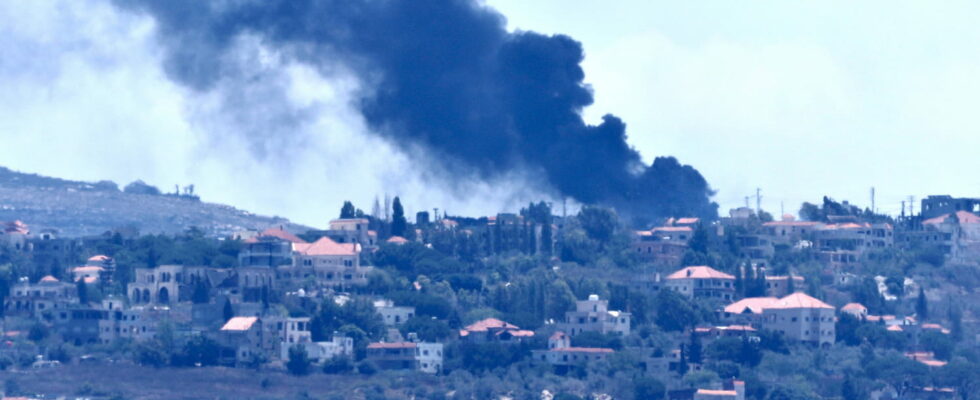In recent days, deadly strikes have taken place in Lebanon and Israel. Why are these countries in conflict? Explanations.
The situation in the Middle East is getting worse. As a result of the war between Israel and Palestine, new actors have entered the conflict, after Lebanon, in turn, attacked the Hebrew state. The latter retaliated. Enough to exacerbate tensions in a region in the grip of conflict since October. The latter seems to have entered another dimension in the last few days after the death of the political leader of Hamas, the Palestinian organization recognized as a terrorist organization by France, the United States and the countries of the European Union, but not by many UN countries, including Russia and Turkey.
Why has the conflict in the Middle East become more serious?
On Wednesday, July 31, Hamas leader Ismail Haniyeh was killed in Tehran (Iran) by an “aerial projectile,” according to local media. The New York Times rather speaks of a bomb hidden for about two months in the residence where he lived. He was in voluntary exile between Qatar and Turkey. A death attributed to Israel by Iran.
The offensive came after a rocket attack by Hezbollah, an Islamist terrorist group based in Lebanon, on Saturday, July 27. In the Golan Heights, a region partly managed by Israel and partly by Syria, 12 young Israelis aged 10 to 16 were killed.
As a result, Israel quickly responded on Tuesday, July 30, with a “targeted strike” in the southern suburbs of Beirut (Lebanon). This targeted the “commander responsible” for firing on Israel. The Hebrew state therefore targeted Lebanon because it is in this country that Hezbollah is based. The organization’s military leader was killed in the attack, as confirmed by the latter, reports France 24. However, according to the Lebanese Ministry of Health, a “preliminary report” also reported a woman and two children killed, as well as 74 civilians injured, The world.
Israel, Hamas, Lebanon, Iran… Who is allied? Who is opposed?
Since the attacks of October 7, Israel has been carrying out a military crackdown on Hamas (the Palestinian organization) in the Gaza Strip, a Palestinian territory. United Nations identified a “serious risk of genocide” in this operation.
If the conflict has escalated in recent days, it is because of Hezbollah’s attack on Israel. Hezbollah is a paramilitary group, considered terrorist, based in Lebanon. Above all, this organization is allied with Iran and is financially supported by the latter. Iran and Israel being at war, Iran has therefore received support from Hezbollah. And Israel has therefore retaliated against Lebanon. Hamas is an ally of the Lebanese Hezbollah and the Iranian government, these three forces therefore have Israel as a common enemy.
Tehran (Iran’s capital) had said that a response against Israel would be swift. On both sides of the border between Lebanon and Israel, strikes attributed to the opposing camp reportedly left several dead and wounded. At his weekly press conference on Monday, August 5, the Iranian spokesman for the Ministry of Foreign Affairs said that Tehran had the “legally right” to punish its sworn enemy, following the assassination of the leaders of Hamas and Hezbollah.
Many countries call on their nationals to leave Lebanon
Following this escalation of tensions, the foreign ministers of the G7 (Germany, Canada, the United States, France, Italy, Japan and the United Kingdom) expressed their “strong concern” about the situation in the Middle East, according to a statement from Italian diplomacy. The United States, Israel’s closest ally, has also strengthened its military presence in the region.
On Monday, August 4, the Quai d’Orsay invited its nationals to make arrangements “now to leave Lebanon as soon as possible”, and “especially those passing through”. A similar appeal was launched by the United States, Sweden, Jordan, Saudi Arabia, the United Kingdom… However, several airlines have already stopped their flights from Lebanon.
Thus, a crowd of travelers gathers at Beirut airport. RFI was able to collect the testimony of some, like Mona, who is trying to leave for Dubai, where her children are settled: “When the Israelis struck in Dahieh [banlieue sud de Beyrouth, NDLR] and in Iran, I was scared. I’ve lived my whole life in war here, so I’ve gotten used to it. But I don’t want to be stuck there,” she confides. Our colleagues also gave the microphone to Ola, an Iraqi woman who came to spend her holidays in Lebanon: “I had a very nice holiday, but short, because of the situation. I was north of Beirut and the situation was good. But because of the information and the recommendations to leave, it’s better to go home and be safe.”
